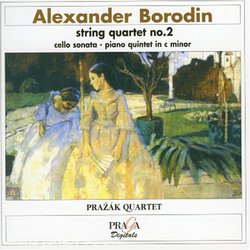| All Artists: Borodin, Prazak, Klepac Title: String Quartet 2 Members Wishing: 1 Total Copies: 0 Label: Praga Czech Rep. Release Date: 7/11/2000 Album Type: Import Genre: Classical Styles: Chamber Music, Historical Periods, Classical (c.1770-1830), Instruments, Strings Number of Discs: 1 SwapaCD Credits: 1 UPC: 794881506828 |
Search - Borodin, Prazak, Klepac :: String Quartet 2
CD Details |
CD ReviewsBeneficent Borodin... Sébastien Melmoth | Hôtel d'Alsace, PARIS | 07/19/2009 (5 out of 5 stars) ".
Borodin's early life reads like something out of Tolstoy's "Family Happiness," as he was the out-of-wedlock son by an old aristocrat and a young woman of good breeding (cf. Marya Alexandrovna in Tolstoy's beautiful story). Borodin was a very gentle man of great intellect. He led an irreproachable life of virtue, culture, and productivity. Indeed, he was so active and successful in his scientific profession it's a wonder he found time for art work at all. So we are fortunate to have the unique works of his slim oeuvre. Basically his art falls into two categories: (1) earlier pieces up to c. 1875, and (2) later masterpieces. The earlier works (including the First Symphony, String Quintet, Cello Sonata, and Piano Quintet) are charming in a Mendelssohnian vein. But it with the later masterpieces that Borodin's inimitable muse is fully expressed in the two String Quartets, the Second and Third Symphonies, the "musical picture" V sredney Azii (In Central Asia), and his chef d'oeuvre, Knyaz' Igor' (Prince Igor). . Borodin's two String Quartets form a major contribution to Russian music as examples to follow for Taneyev, Glazunov, Glier, Myaskovsky, and of course Shostakovich. The A-major Quartet is a masterwork in its own right. But the D-major Quartet is justifiably better known and most beloved, for it is a piece of such sublime beauty and unsullied expressiveness that it really must go on any short list of the greatest chamber music of all time. Its elements include (to paraphrase David Lloyd-Jones) a pervading sense of serenity and euphony; endlessly sweet lyricism; light texture, neat design, and heartfelt elegeiakos. From its opening bars, the uniquely Russian character of this music is obvious: abstract quartet form aside, the languorous melodiousness is unlike anything heard in Western music heretofore. The mercurial scherzo advances the rhapsodic mood towards the excruciatingly lovely Notturno whose luxuriant amorousness trails off into rapturously climbing perdendosi sequences leading unto a blissful ecstasy which can only be rivalled by Isolde's Liebestod. . The Prazák ensemble is heir to the older Prague Quartet, and continues the Bohemian tradition of refined precision and intellectuality. . Tolstoy's Short Fiction: (Second Edition) (Norton Critical Editions) Anton Chekhov's Short Stories (Norton Critical Editions) . Borodin: String Quartet No. 1 in A Major; String Quartet No. 2 in D Major Borodin: String Quartets 1 & 2 Borodin: Chamber Music Borodin: Chamber Music Borodin, Glinka: Orchestral Works Borodin: Orchestral Works Sheherazade (In Central Asia) Alexander Borodin: Prince Igor ." |

